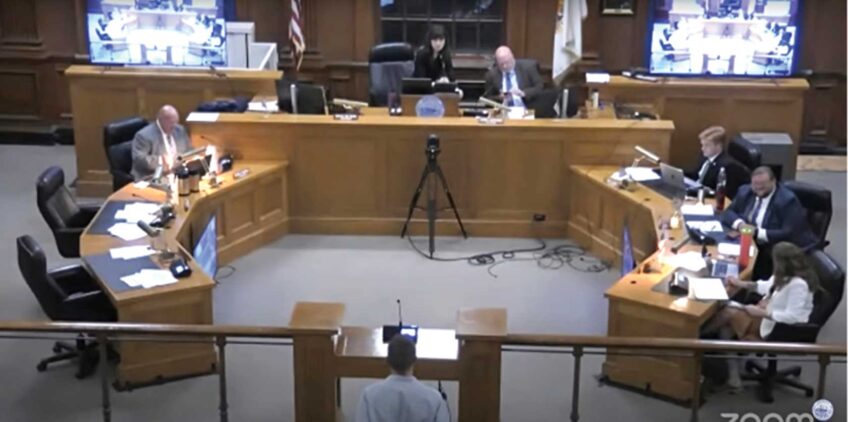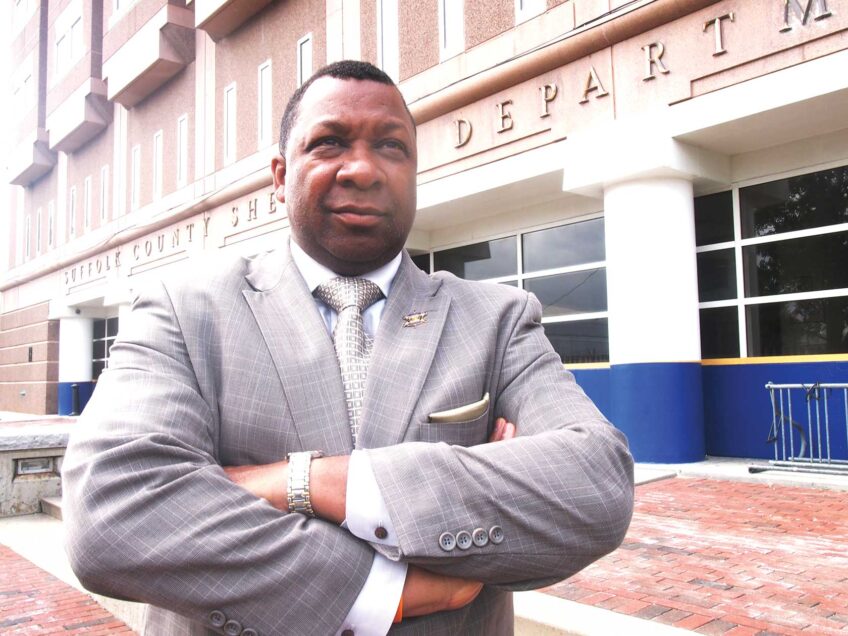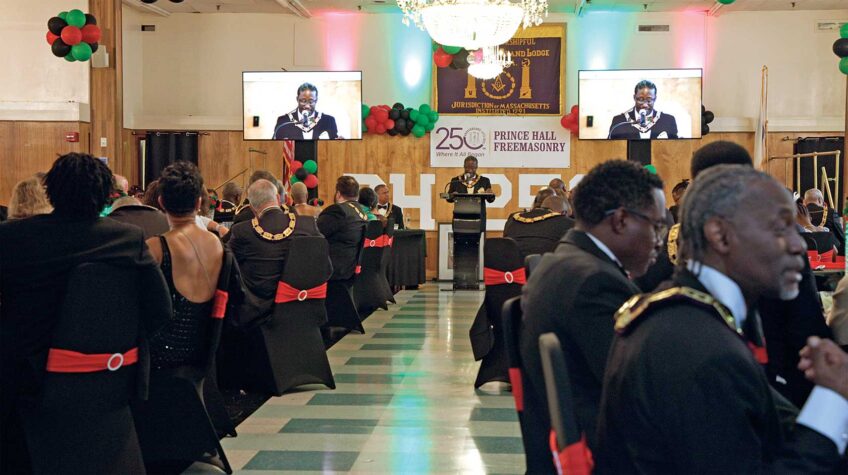NeighborHealth’s new radiology suite may increase access to care, reduce health inequities
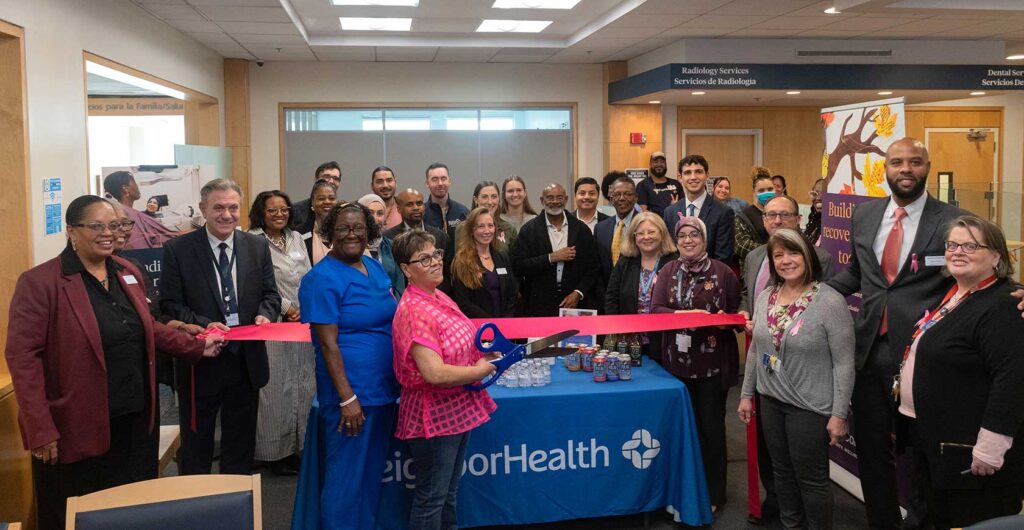
For South End residents, a new radiology suite is anticipated to mean improved, faster access to breast cancer screenings and X-rays.
Staff and supporters celebrated the ribbon-cutting of the new space at the NeighborHealth South End location — formerly the South End Community Health Center — in an event Oct. 25. It first opened to patients earlier this month.
Leadership at NeighborHealth said the new suite will make it easier for patients to access care and could be one step to cut down health inequities in the city.
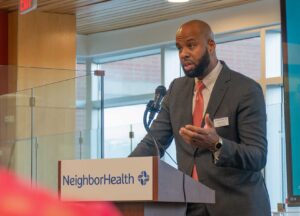
Greg Wilmot, president and CEO of NeighborHealth, delivers remarks at the ribbon cutting of the new radiology suite at the company’s South End health center location. The new suite, which provides X-rays and mammograms, is expected to increase access to screening and care for patients at the health center with shorter wait times and easier access. PHOTO: AVERY BLEICHFELD/BAY STATE BANNER
“Many thousands of patients will be able to get those critical services right here in the community, right here in their primary care practice, which is just tremendous,” said Greg Wilmot, president and CEO of NeighborHealth. This organization is 55 years old. To be continuing to bring new services and new opportunity to our community is just it is a special day.”
Citywide, the wait-time for mammograms is about three months, on average, said Mimi Gardner, vice president and chief equity officer at NeighborHealth. Through the health center, patients can currently get an appointment in a week or two (though Green and Gardner both said that might have to do with how new the facility is).
For regular X-rays, patients can get in the same day as other medical care appointments at the facility.
Long wait-times can cause patients stress. Gardner said she had spoken with a staff member at the South End health center who found a lump on her breast but had to wait six months at another facility to get a mammogram.
“There’s just the fear of — when you see something’s wrong — not to be able to get care,” Gardner said. “This allows people to come in much earlier for the routine screenings, as well as if they have a concern.”
Delays in access can also impact patient outcomes, especially for women of color who already face disparities around breast cancer care and outcomes.
According to a 2022 report published by the American Cancer Society, Black women are 41% more likely to die from breast cancer than white women, despite similar or lower incidence rates. That likely stems, in part, from the fact that breast cancer in Black women is less likely to be caught in early stages. The same ACS report identified that 67% of white women were diagnosed with early-stage — and generally more easily treatable — breast cancer compared to 57% of Black women.
“With regard to cancer, early detection is critical to be able to begin interventions as appropriate,” Wilmot said. “There’s just synergy of having it co-located with the care team.”
In addition to the new South End radiology suite, groups across the city are taking steps to attempt to close racial gaps in breast cancer outcomes.
In its new suite, its room for X-rays has been seeing about 20 patients per day and its new mammography room has been serving about 15 per day, said Jaynié Green, senior project manager for the radiology suite.
Once the scans are complete, they’re sent to nearby Boston Medical Center for reading. Sihan Elalami, radiology manager at the center, said that, for X-rays, reports tend to come back in about 24 hours. Mammography results are returned in about a week.
Wilmot and Gardner also pointed to the fact that accessing services at a health center is often more comfortable for community members than having to go to a larger hospital campus that might feel less comfortable and more intimidating.
“I think one of the best things about this is that the people who are working here look like the patients, so there’s cultural understanding, there’s humility, where they get an opportunity to really be able to talk to somebody who looks like them,” Gardner said. “It’s not cold, it’s not sterile.”
For mammography services, the health center was previously served by Dana-Farber Cancer Institute’s mobile screening van. Wilmot said access to the van was a great resource, but that he’s excited to provide increased access to patients who are already coming to the building for primary care services.
“[The mammography van] helped us for many years, and it helps many other community health centers,” he said. “The benefit of now creating this service here in the facility is that we’ll be able to serve many more patients with just much more access and more timely services.”
Since the suite started serving patients, Green said patients have highlighted more the frequent care provided in-house as one of the biggest pieces of positive feedback.
“The van would come once a month,” Green said. “So once a month was the only time they were offering mammograms. Versus now, for our patients, it’s pretty much walk-in.”
Wilmot said the addition of services like those provided by the radiology suite will be important additions as organizations across the state look to close health equity gapss.
“The conversation about health equity continues to evolve in the Commonwealth,” Wilmot said.
“As part of this conversation, we must acknowledge that equity requires investment.”
He touted a number of investments that East Boston Neighborhood Health Center and the South End Community Health Center — the two organizations merged and rebranded in June — have made in recent years.
In July 2023, East Boston Neighborhood Health Center announced the completion of a rebuild of its emergency department. The center is the only community health center in the state that operates its own emergency department. That remodel included the addition of a new CT imaging service.
That November, the health center also added a behavioral health urgent care facility alongside its emergency department, which offers same-day and urgent mental health care, as well as sets up follow-up appointments for patients who come in.
And on the horizon, NeighborHealth is planning to open a new East Boston primary care practice with 18 exam rooms and a focus on team-based care to better connect patients with a more comprehensive suite of services. That practice is expected to open next spring.
“The investment is significant, but so is the return,” he said. “Thousands of families have access to valuable preventative health care services in the community and co-located with primary care. … You can’t move the dial on health equity without investing in real services that we can touch and experience.”
Wilmot said he counts the new radiology suite among those investments that will help reduce disparities in access to care and health outcomes.
“It does take investment and it’s projects like this that are going to help to close these long standing, pervasive equity gaps,” he said. “We’re excited to be a part of the solution in that regard.”




